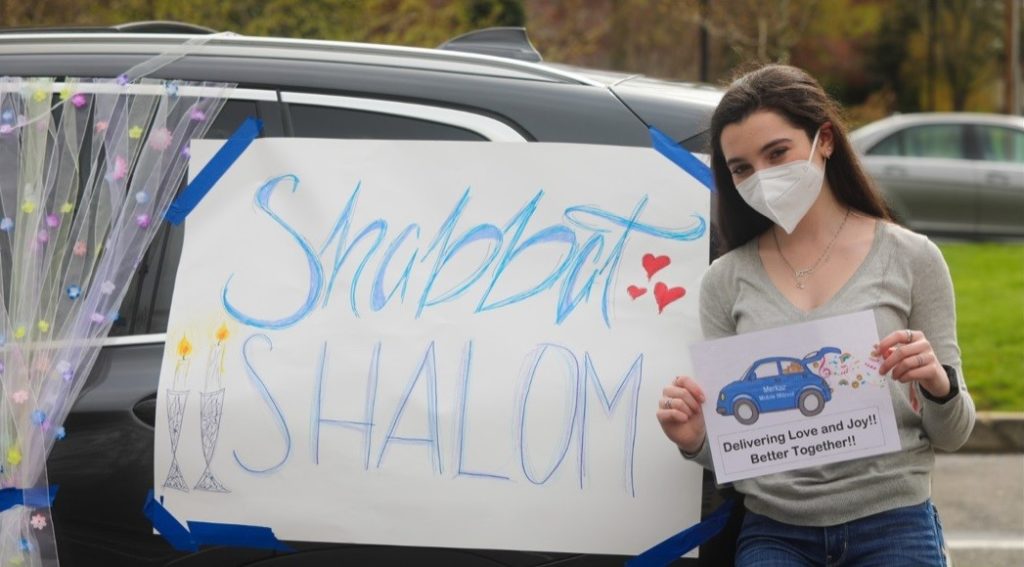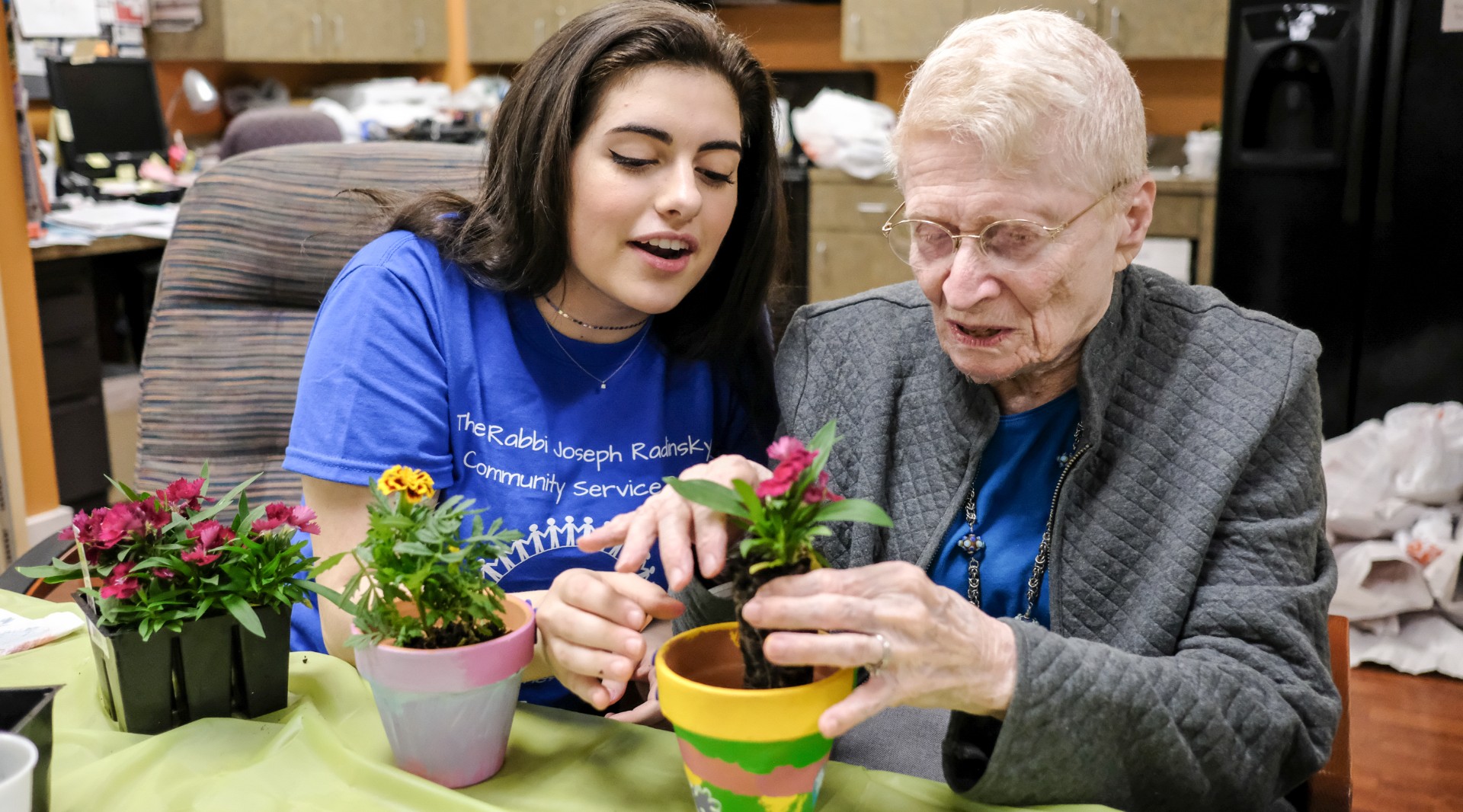When the COVID-19 pandemic began, 15-year-old Samantha Renzulli immediately thought about how it would affect her elderly friends at Jewish Senior Services, a long-term care facility in Bridgeport, Connecticut.
Renzulli had met some of the residents through Better Together, a school-based Jewish intergenerational program, and she worried about their isolation.
“I was aware of the loneliness the residents must have been experiencing, as they were unable to have visitors or leave their rooms,” Renzulli said. “As I thought back to all the fun times I shared with the residents, it saddened me to think of their lack of companionship during this time.”
So she and her fellow students at the Merkaz Community High School for Judaic Studies resolved to find new ways to maintain connections to the seniors. Since mid-April, students’ families have paraded in long caravans of decorated cars around the residence every Friday as residents and staff look on from balconies. They’ve also delivered more than 130 bouquets of donated flowers for residents, and a trove of books, toys and toiletries for staff members and their families.
On Mother’s Day, Renzulli and her young friends shared with the seniors a “musical mitzvah mashup” video they created especially for them.
In normal times, Better Together, a project launched in 2014, pairs together young Jews and older Jews for meaningful in-person interactions. Middle- and high-school students from Jewish day schools, Hebrew schools and Jewish youth groups meet with the residents of senior centers or groups of seniors from local synagogues.
Faced with the pandemic, students have found innovative ways to continue connecting with their elder “buddies” despite social distancing protocols. Rather than reducing operations because in-person encounters are not possible, Better Together ended up expanding its scope of activities to meet surging interest, introducing a modified version of its program that can be replicated in communities across the country.
Called Better Together in a Box, it’s a free, downloadable curriculum designed for the upcoming summer of social distancing, when camp, internships and many other Jewish summer activities will be cancelled. Jewish organizations that commit to implementing the program are eligible for a grant to cover staffing and materials.
Better Together in a Box includes materials for teen learning sessions on Jewish values such as leadership, responsibility, empathy, wisdom and wellness. It suggests virtual intergenerational activities, including cooking, fitness and art, with detailed plans on how to implement them – synchronously or not – based on the technological ability and the teens’ and seniors’ hardware. Activities include letter writing, Mad Libs, teens creating short videos to engage with the seniors, and discussions on health and community.
“What we mean by ‘in-a-box’ is that it is a ready-to-use curriculum, and that it is designed for doing things virtually, or at least not in person,” said Bess Adler, Better Together’s program director.
The program’s pandemic-era pivot is a sign of how some Jewish initiatives are adapting and innovating to meet the needs of the times.

Samantha Renzulli was among the Jewish students who brought flowers, signs and good cheer to staff appreciation day at Jewish Senior Services, a long-term care facility in Bridgeport, Connecticut. (Margery Verlezza)
Organizers are hoping camps, youth groups, congregational schools and Jewish day schools will utilize the curriculum for youths ranging in age from middle school to high school. An optional writing contest offers students prizes and the possibility of getting an article published based on their summer experiences.
Yolande Dauber, 101, is eager to continue participating in Better Together this summer. A resident of The Medallion, an assisted living residence in Houston, she has enjoyed her conversations with her young buddy from the Robert M. Beren Academy, a modern Orthodox day school in Houston.
“It’s nice to mingle with young people,” said Dauber, who once worked as a middle school guidance counsellor in her hometown of Brooklyn. “They have interesting ideas, and I enjoy hearing about their plans for the future.”
Dauber misses hugging and kissing the students as they arrive at The Medallion but understands that she can’t meet them in person for the foreseeable future. Adept at using her computer and Kindle, she is confident she’ll be able to participate in online activities organized by Beren Academy students this summer.
Since the beginning of the pandemic, students from the school have been calling their senior buddies to wish them Shabbat Shalom, and created videos for them.
“Some of the residents even made selfie videos and sent them back to us in return,” said 17-year-old Natanya Ruben, who will participate in Better in a Box this summer following cancelled plans for a family trip to South Africa.
Not all seniors are able to use technology. Rabbi Ari Kellerman, the Judaic studies principal at Beren Academy’s middle and high schools, has been trying to come up with other activities. A consultant to Better Together in a Box, he devised the idea of a Buddy Box, where teens can send their elderly partners fun items such as craft project materials along with video cards with filmed clips of themselves offering greetings and project instructions.
Until now, students have produced elaborate works based on their yearlong interactions with their senior buddies, such as photography exhibitions, documentary films, large quilts, and travel scrapbooks reflecting global destinations that have played important roles in the seniors’ lives.
Now, the focus is a bit different.
“COVID poses such a big challenge,” Kellerman said. “We need to shift from thinking so much about fun activities to making sure our seniors are okay.”
Devra Aarons, director of the Contra Costa Midrasha, a community-based weekly Jewish educational program for 8th through 12th graders in Walnut Creek, California, said the emphasis now must be on maintaining relationships and cultivating empathy. Her students are partnered with residents of The Reutlinger, in nearby Danville.
“I find that the teens are very good with coming up with ideas for using videos and other tech,” Aarons said. “Maybe we’ll just focus on teaching the seniors how to use the technology at first. That could be a good way to stay connected.”
In Connecticut, Renzulli has taken the lead in designing intergenerational activities. With her planned five-week summer language-immersion program in Spain cancelled, she said one of her main priorities this summer will be focusing on “bringing love and joy” to residents of Jewish Senior Services, and “showing them and the nurses at their aid that our community is here to support them.”
Renzulli’s mother, Laurie Renzulli, said the project has helped boost her daughter’s spirits during this challenging time.
“The weekly meetings for planning and execution of the activities have helped tremendously during this time of home education and limited social interactions,” she said. “Each week there have been deliverables to accomplish, and when each weekly mitzvah hits a milestone or completion, Samantha feels she has made a positive difference in our community and the world.”
JTA has documented Jewish history in real-time for over a century. Keep our journalism strong by joining us in supporting independent, award-winning reporting.
This story was sponsored by and produced in collaboration with a foundation that wishes to remain anonymous, and is part of a series titled "On the Bright Side: Stories of innovation and resilience from Jewish non-profits.” This article was produced by JTA's native content team.
More from Anonymous Foundation





